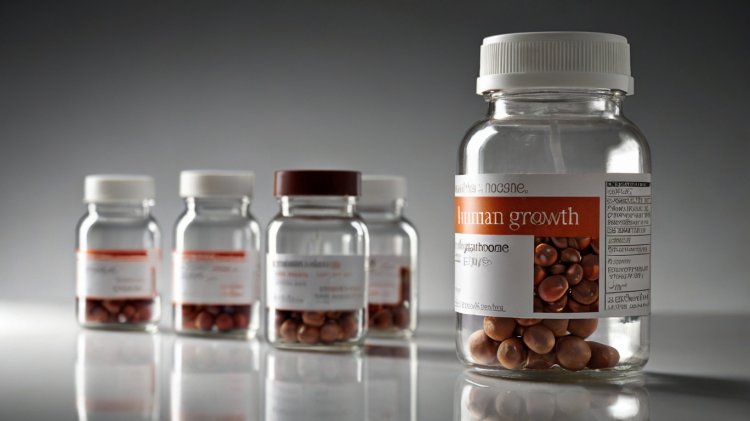Understanding the Benefits and Risks of Synthetic Human Growth Hormone (hGH)
Discover the uses, benefits, and potential side effects of synthetic human growth hormone (hGH). Learn about its applications in medicine, athletic performance, and anti-aging, along with the importance of safe usage under medical supervision.

What Is hGH?
Human Growth Hormone (hGH) is a naturally occurring hormone produced by the pituitary gland. It plays a vital role in growth, cell regeneration, and maintaining healthy tissue in the brain and organs. Synthetic hGH has become a significant tool in treating various medical conditions, but its use comes with both benefits and risks.
In this blog, we’ll explore the applications of synthetic hGH, its popular forms, potential side effects, and considerations for its safe use.
What Are the Benefits of Synthetic hGH?
Synthetic hGH is primarily used in medicine to treat specific medical conditions, but its perceived benefits have also made it popular among athletes and for anti-aging purposes.
Medical Uses
Synthetic hGH is prescribed for conditions including:
- Chronic kidney disease: Supports growth in children with kidney failure.
- Growth hormone deficiency: Addresses poor growth in children and adults.
- Short bowel syndrome: Aids in nutrient absorption for individuals with intestinal disorders.
- Muscle wasting due to HIV/AIDS: Helps maintain muscle mass.
- Turner syndrome and Prader-Willi syndrome: Treats specific genetic conditions causing growth delays.
Performance and Aesthetic Applications
Although controversial, hGH is often used for:
- Athletic performance: Enhancing muscle mass and exercise capacity.
- Anti-aging: Reducing body fat and improving skin quality, though scientific evidence is limited.
- Bone health: Improving bone density and reducing fracture risks.
Popular Forms of hGH
-
Injectable hGH
- Administered intramuscularly (IM) or subcutaneously (under the skin).
- Commonly used in clinical treatments and sometimes illicitly for non-medical purposes.
-
Dietary Supplements
- Known as hGH releasers or amino acid blends (e.g., SeroVital).
- Claimed to stimulate natural hGH production but lack substantial evidence to support these claims.
-
Homeopathic Remedies
- Marketed for general wellness but lack regulatory approval or scientific backing.
Risks and Side Effects of hGH
While synthetic hGH offers several benefits, improper or excessive use can lead to significant health risks.
Potential Side Effects of hGH Injections
- Neurological and Musculoskeletal Issues: Nerve, muscle, or joint pain; carpal tunnel syndrome.
- Fluid Retention: Swelling in arms and legs (edema).
- Metabolic Concerns: Increased cholesterol levels, risk of diabetes, and low blood sugar.
- Cardiovascular Risks: Enlarged heart and heightened risk of heart disease.
- Hormonal Imbalances: Enlarged breasts in men (gynecomastia), mood changes, and withdrawal symptoms.
- Physical Changes: Growth of facial features, hands, and feet (acromegaly).
Side Effects of hGH Supplements (e.g., SeroVital)
- Digestive Issues: Nausea, vomiting, diarrhea, and constipation.
- Cardiovascular Concerns: Low blood pressure and increased asthma symptoms.
- Other Reactions: Allergic responses and exacerbated gout.
Is hGH Safe?
Using synthetic hGH should always involve careful consideration and medical supervision. Here are key safety tips:
- Use Only with a Doctor’s Prescription
- Ensure hGH is obtained legally and for medically approved conditions.
- Monitor Your Health
- Regularly consult your doctor and track your body’s response.
- Consider Alternatives
- Improve health naturally through a balanced diet, regular exercise, and healthy lifestyle habits if you don’t have a medical condition requiring hGH.
The Takeaway
Synthetic hGH has shown promise in treating specific medical conditions and enhancing quality of life. However, its misuse or overuse can lead to significant side effects, especially when used for non-medical purposes like performance enhancement or anti-aging.
For those without growth hormone deficiencies, focusing on sustainable lifestyle habits is a safer and more effective way to achieve long-term health and wellness. Always consult a healthcare professional before considering hGH or related supplements.
FAQs
1. What is human growth hormone (hGH)?
hGH is a hormone produced by the pituitary gland that supports growth, cell repair, and metabolism. Synthetic versions are used to treat growth deficiencies and other conditions.
2. Can hGH slow aging?
While hGH is claimed to reduce signs of aging, scientific evidence is limited, and its use for anti-aging purposes remains controversial.
3. What are the common side effects of hGH?
Side effects can include muscle pain, swelling, high cholesterol, and an increased risk of diabetes or heart disease.
4. Are hGH supplements effective?
Most over-the-counter hGH supplements lack scientific backing for their claims and do not contain actual hGH.
5. How can I improve my health without hGH?
Adopt a balanced diet, exercise regularly, get adequate sleep, and manage stress to enhance overall health naturally.







